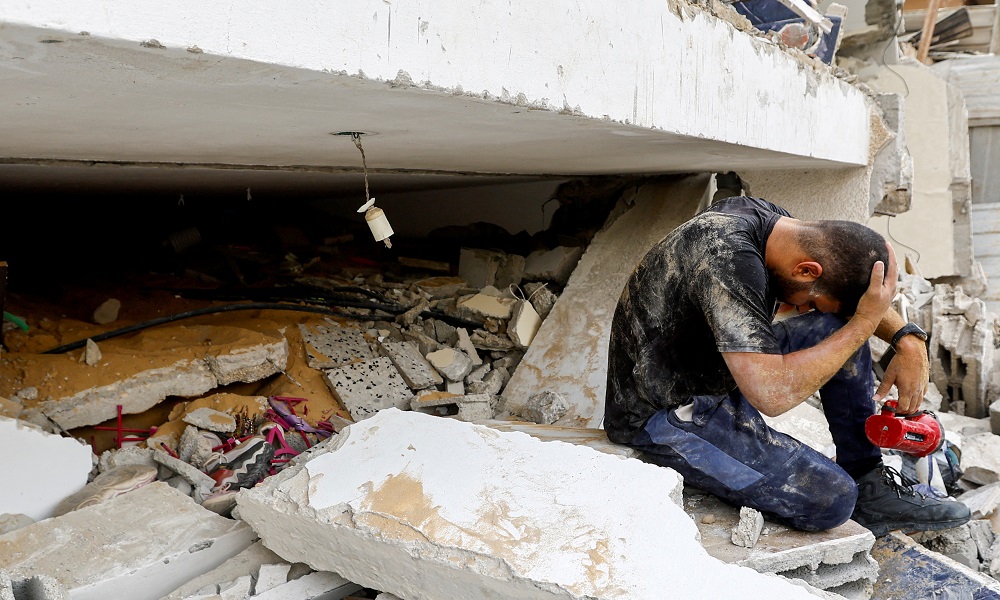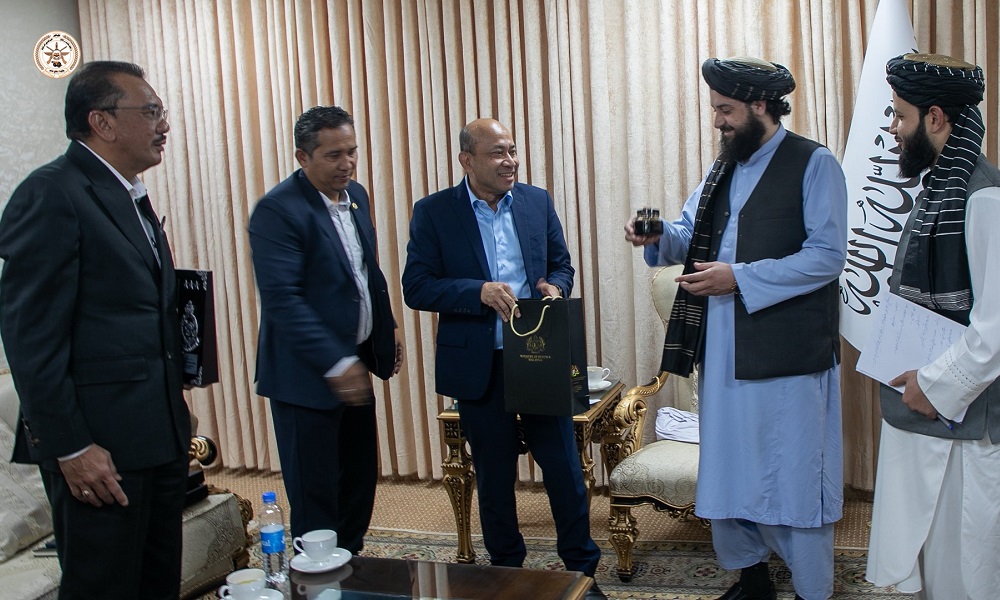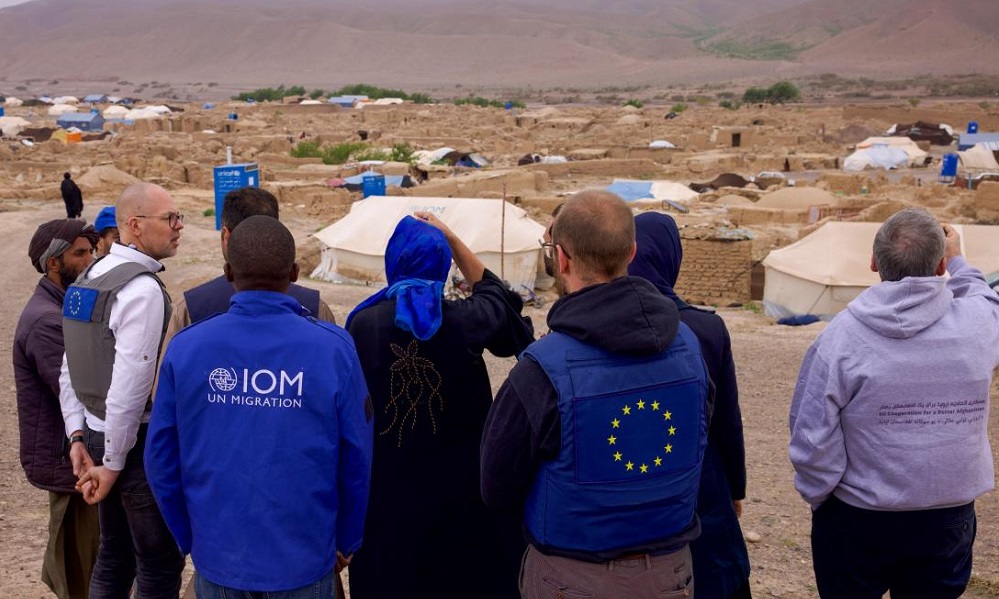Latest News
Gazans bombarded by Israel have no hope and no escape

Most of the 2.3 million people in the Gaza Strip have no electricity and no water. And, with hundreds of Israeli strikes raining down on their tiny enclave, they have nowhere to run.
The Palestinian territory, one of the most crowded places on Earth, has been under siege since Saturday in a near-constant bombardment that Gazan health officials say has killed more than 1,000 people. The blitz is retaliation for a devastating attack on Israel by Gaza’s ruling group Hamas which the Israeli military says killed more than 1,200 people, Reuters reported.
Gaza’s sole power station, which had been working intermittently for days, cut out on Wednesday after running out of fuel. Without power, water can’t be pumped into houses. At night there’s nearly total darkness punctuated by fireballs and the pin-pricks of light from phones used as flashlights.
“I lived through all the wars and incursions in the past, but I have never witnessed anything worse than this war,” said Yamen Hamad, 35, a father-of-four, whose home had been destroyed by Israeli strikes on the northern Gaza town of Beit Hanoun.
At a hospital in Khan Younis in southern Gaza, relatives and friends lined up outside the overloaded morgue where bodies were laid out on the floor because coolers were full or had no power.
The mourners were desperate to bury their loved ones swiftly before the unseasonable heat took its toll. They spoke briefly over the bodies, praying for the souls to rest in peace, before they carried them to graves nearby, with stretchers if they were available, or otherwise without.
Reuters interviewed more than three dozen people in Gaza, and most echoed Hamad’s sentiments. They painted a picture of dread and hopelessness in the face of what they described as the worst violence they’d ever seen.
With the strip’s only other border, to Egypt, blocked by Egyptian authorities, the people said they were trapped. They feared the worst was yet to come, including a possible ground invasion, as Israel seeks retribution for the deadliest Palestinian militant attack in the country’s 75-year history.
That surprise raid, launched on Saturday, saw Hamas militants burst out of Gaza and kill hundreds of people, leaving corpses strewn around a music festival and a kibbutz community. Scores of Israelis and others have been taken to Gaza as hostages, some paraded through the streets.
The Hamas attack drew strong condemnation by the United States and other Western governments. The militant group’s 1988 founding charter called for Israel’s destruction, and the group is branded a terrorist organization by Israel, the United States, the European Union, Canada, Egypt and Japan.
Israeli Defence Minister Yoav Gallant has pledged to intensify the military campaign in Gaza, saying on Wednesday that Israel would wipe Hamas “off the face of the Earth”.
Beit Hanoun, near the frontier with Israel, was among the first places hit hard by retaliatory Israeli strikes, with many roads and buildings destroyed and thousands of displaced, according to Hamas and local residents.
There was no escape for Ala al-Kafarneh’s family.
The 31-year-old said he fled the town on Saturday with his pregnant wife, his father, brothers, cousins and in-laws. They drove to Beach Refugee Camp on the coast, where they hoped they would be safer, but air attacks began targeting that area too so they headed to Sheikh Radwan, another district deeper east.
On Tuesday night, an airstrike hit the building where Kafarneh and his family were sheltering, killing all of them except him, he added.
“We escaped from danger into death,” Kafarneh said outside the Shifa hospital in Gaza City, his head cut and a plaster cast running from his shoulder to his wrist. He was sitting on a pavement near hundreds of other people living in the open next to the hospital. Some said they hoped that its presence might offer them some protection from the bombardment.
“I’m homeless now,” said Youssef Dayer, 45, sitting on the ground by the hospital. “Maybe it’s safe. Maybe. It’s a peaceful civilian place, right? Maybe not. Nowhere seems safe,” he added.
Some people outside the hospital had brought blankets or strips of cardboard to sleep on, others had flung themselves straight down onto the bare ground. There were long queues for people to use the few toilets inside the hospital.
More than 175,000 Gazans have fled their homes since Saturday, according to the United Nations. Some aid agencies in Gaza say the conditions are the worst they can remember even after repeated conflicts and 16 years of an Israeli blockade since Hamas took power there in 2007 following a brief civil war with forces loyal to Palestinian President Mahmoud Abbas’ Fatah faction.
“The civilian loss this time … is unprecedented,” said Hisham Muhanna, spokesperson for the International Committee of the Red Cross in Gaza.
At another hospital, Medecins Sans Frontiers doctor Mohammad Abu Mughaseeb said medical supplies had been lacking for years. The intensified Israeli siege meant fast-dwindling stocks would run out in weeks, he said.
“If things continue like this for a few days the health system will collapse,” he said after sleeping at the hospital because his own home had been damaged in a blast.
The lack of electricity has cut off much of the enclave’s water supply. Men and boys stood near one of the few supplies in Khan Younis loading huge tanks onto three-wheeled rickshaws, carts they dragged by hand and a small wagon pulled by a horse.
The Gazan health ministry said hospitals and other medical facilities running on fuel generators were expected to run out of power in the next few days. The ministry said it feared that sewage treatment facilities would also come to a halt, leading to growing waste and disease across the territory.
Hamas, as the de facto government of the Gaza Strip, runs the police, hospitals, ambulance service, plus the civil emergency department.
U.N. schools have become the main places of shelter for Gazans who have fled their homes, with families crowded into classrooms, some sleeping on mattresses others on blankets.
At one school in Gaza City, the sound of blasts frightened the children, keeping them and their parents awake. Many people sat outside in the open, scared they’ll be buried by airstrikes that pancake concrete buildings.
In Khan Younis, an ambulance stood at the end of an alleyway with its siren blaring, a man sat inside cradling his young daughter, their eyes staring wide from faces covered in dust. “Don’t be scared, don’t be scared,” he whispered over and over.
Latest News
Tripartite trade meeting held in Kabul to boost regional connectivity

A tripartite meeting between the delegations of Afghanistan, Turkmenistan and Kazakhstan was held in Kabul with the aim of connecting North Asia to South Asia and reducing transit and transportation costs among these three countries, the Ministry of Trade and Commerce said in a statement.
In this meeting, an agreement was reached on the creation of a joint technical committee to continue the talks.
This tripartite meeting was held under the leadership of Nooruddin Azizi, the Acting Minister of Industry and Commerce, Vice President of Turkmenistan and Srik Zhumangarin, the Deputy Prime Minister of Kazakhstan.
Earlier, a bilateral meeting was held between the delegation of the Islamic Emirate and Turkmenistan. The ministry of commerce said the participants of the meeting discussed the construction of a large joint logistics center in Torghondi, the trilateral transit agreement between the IEA, Turkmenistan, and Kazakhstan, the expansion of Afghanistan’s railway, solving issues related to Afghan transit and export goods, and a number of other commercial issues.
Latest News
No destructive groups including Daesh present in Afghanistan: Yaqub Mujahid

Acting Minister of National Defense Mohammad Yaqub Mujahid has said that no destructive groups including Daesh have physical presence in Afghanistan, adding the Islamic Emirate of Afghanistan (IEA) will not allow anyone to pose threat to any country in the region from the Afghan soil.
Mujahid made the remarks in a meeting with a delegation from Malaysia in Kabul on Thursday.
According to a statement released by the Ministry of Defense, Mujahid highlighted Malaysia’s “good treatment” of Afghan refugees and its long-standing relations with Afghanistan, and said that Malaysia is a powerful Islamic country and visits should increase.
He added that with the establishment of the Islamic Emirate, occupation and war ended in Afghanistan, and the country is fully secure.
Based on the statement, the Malaysian delegation called Afghanistan a friendly country and while emphasizing on comprehensive cooperation, it assured that what they have seen in Afghanistan will be shared with the authorities of their country.
Latest News
EU allocates 17 million euros to support Afghans on the move

The European Union signed an agreement worth 17 million euros with the International Organization for Migration (IOM) to improve access to basic services, increased economic opportunities and protection for Afghans on the move and their host communities in Afghanistan.
The needs of women and girls are a particular focus of the programme, EU said in a statement released on Thursday.
The statement noted that from January 2023 until April 2024, over 1.5 million Afghans returned from Pakistan and Iran.
“I am deeply moved by the hardship returnees face when being deported to Afghanistan. In a country suffering from poverty and climate change, and in a city that just saw devastating earthquakes, this truly is a crisis within a crisis.”, said Peteris Ustubs, Director for the Middle East, Asia and Pacific of the European Commission’s Department for International Partnerships during the signing ceremony at the IOM transit centre in Herat.
Raffaella Iodice, EU Chargée d’Affaires a.i. to Afghanistan, added “The solidarity of the Afghan people towards their brothers and sisters is an inspiration. We must assure that communities hosting and helping new arrivals are supported. The partnership with IOM ensures access to essential services and provides protection for Afghan returnees and their host communities. As women and girls can be particularly affected, we make sure that all members of society can benefit”.
“IOM’s continued partnership with the EU has been critical in enabling our teams to reach hundreds of thousands of Afghan returnees and other vulnerable communities in the country”, said IOM Afghanistan Chief of Mission, Maria Moita. “Thanks to this renewed commitment, we will be able to focus on addressing the immense challenges in the areas of return and contribute to reintegration, social cohesion, and longer-term solutions for those communities.”
This additional contribution is part of a 5-year programme that is being implemented across Afghanistan and in four countries in the region. It builds on the EU’s previous support to IOM to improve the wellbeing of Afghans forced to return to the country, EU said.
-

 Latest News3 days ago
Latest News3 days agoRashid Khan named AWCC’s brand ambassador
-

 Regional4 days ago
Regional4 days agoIranian president lands in Pakistan for three-day visit to mend ties
-

 Sport4 days ago
Sport4 days agoKolkata beat Bengaluru by one run in IPL as Kohli fumes at dismissal
-

 Sport4 days ago
Sport4 days agoACL: Aino Mina 3-0 Istiqlal Kabul; Attack Energy 3-0 Khadim
-

 Climate Change4 days ago
Climate Change4 days agoRescuers race to reach those trapped by floods in China’s Guangdong
-

 Business5 days ago
Business5 days agoAfghanistan, Kazakhstan to hold joint expo in Kabul
-

 World3 days ago
World3 days agoMalaysian navy helicopters collide in mid-air, 10 killed
-

 Sport3 days ago
Sport3 days agoJaiswal ton powers Rajasthan to big IPL win
























